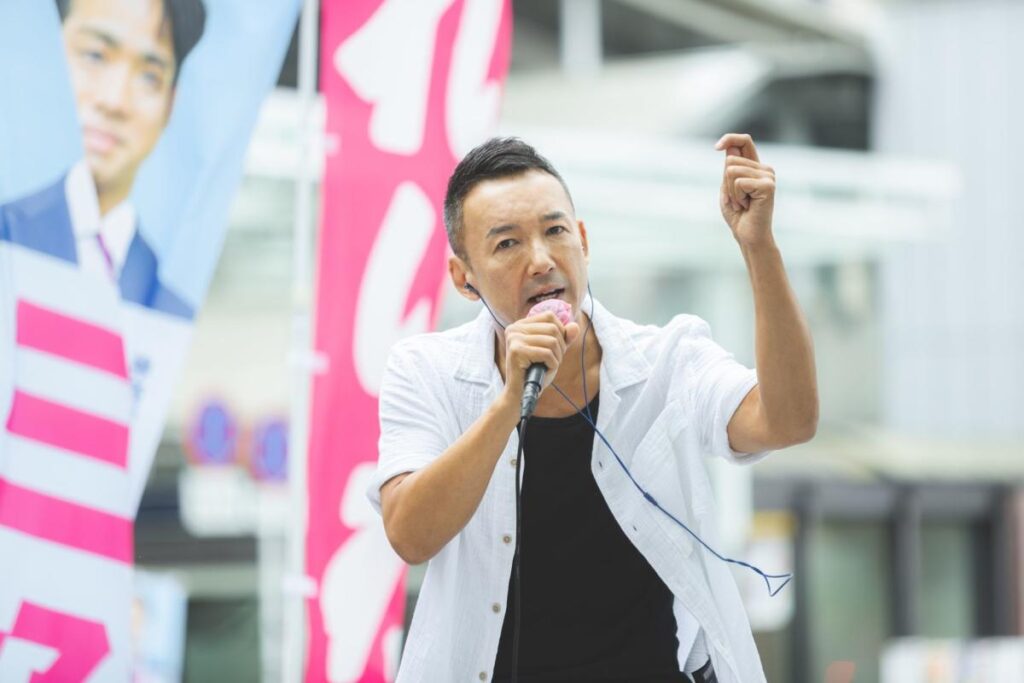Taro Yamamoto, the leader of Japan’s Reiwa Shinsengumi party, has strategically embraced the color pink to define his anti-establishment, left-wing movement. This bold aesthetic choice resonates throughout his campaigns, as evidenced by its presence on everything from posters to campaign vehicles. When asked why he chose pink, Yamamoto’s response was straightforward: “Because I like it.” However, the choice is symbolically rich, as Reiwa Shinsengumi is no ordinary political party. Yamamoto, who first gained fame as an actor—most notably for his role in the cult classic film “Battle Royale”—channels themes of resistance and rebellion akin to his cinematic characters. The party’s name evokes the image of a group of rogue warriors (the historical Shinsengumi) who fought for justice during Japan’s turbulent 19th century, aligning their cause with a narrative of modern-day heroism.
Launched in 2019, Yamamoto’s political career transitioned from being a legislator for the Liberal Party to establishing the Reiwa Shinsengumi, a movement that might seem like a playful venture but has had a significant impact on Japanese politics. His decisive electoral strategy during the House of Councillors election showcased a commitment to representation, as he prioritized candidates with disabilities, Yasuhiko Funago and Eiko Kimura. Their election marked a historic change within the House of Councillors, prompting necessary adaptations to ensure their access to parliamentary proceedings. Yamamoto’s political innocence did not hinder his ambitious pursuits; he later turned his attention to the Tokyo governor’s race, where his proposals, including cash stipends for residents amid the COVID-19 pandemic and criticism of the Tokyo Olympics, did not yield victory but did stir substantial public discourse.
Reiwa Shinsengumi’s political narrative is characterized by a flamboyant and provocative approach to campaigning. Over the years, Yamamoto has garnered attention for various high-profile actions, such as his direct intervention against an anti-immigration law. His party’s platform has evolved and adapted, with a notable shift towards international issues, including a vehement opposition to Israel amid ongoing protests related to Palestine. Akiko Oishi, one of the party’s lawmakers, has drawn attention with outspoken allegations against Israel’s actions in conflict zones, further solidifying the party’s commitment to addressing global human rights issues. Such actions have helped Reiwa Shinsengumi carve out a notable identity in the parliamentary landscape, where media attention is often lavished upon their theatrical protests and legislative maneuvers.
Yamamoto and his party, however, do not shy away from controversy within progressive circles. Their positions on certain geopolitical issues, such as opposing Japanese government support for Ukraine in light of Russia’s invasion, have sparked critical dialogue about what it means to be “pro-peace.” Furthermore, the party’s affiliation with groups that harbor skepticism towards vaccines and governmental science has alienated some traditional supporters of the left. Despite this, or perhaps because of it, Reiwa Shinsengumi continues to resonate within specific activist communities, leveraging public discomfort and dissatisfaction with mainstream political narratives to bolster its standing.
Recent projections for Japan’s elections suggest Reiwa Shinsengumi could expand its influence significantly, possibly doubling its representation in the lower house of parliament. This suggests that even as they navigate controversial waters, Yamamoto’s party has managed to cultivate a foothold of support, with the distinctive pink branding serving as a visual metaphor for their growing audacity in the political sphere. While they have much growth ahead to translate this popularity into meaningful legislative influence, the potential for Reiwa Shinsengumi to claim a more prominent role in Japan’s political arena is evident. Their blend of media-savvy activism and progressive proposals offers them a unique place amid a complex political landscape.
The phenomenon of actors and entertainers crossing over into politics is not unique to Yamamoto; Japanese society has a long history of celebrities successfully transitioning to political roles. This cultural trend reflects broader societal dynamics, where public personas wield significant influence beyond the realms of entertainment. Yamamoto’s journey exemplifies how charisma and a cultivated image may resonate with voters, particularly in a country where traditional political affiliations are often challenged by emerging voices. The melding of entertainment with politics could be seen as both a strategic endeavor and a reflection of the changing tides in Japan’s electoral landscape, emphasizing that individuals can leverage their public recognition to impact legislative outcomes.
Ultimately, Taro Yamamoto’s Reiwa Shinsengumi stands at the intersection of pop culture and political resistance, advocating for marginalized voices while challenging existing structures. As their ideology and aesthetic continue to gain traction, the implications of their rise could signal a paradigm shift within Japanese politics. The party’s defiance against conventional norms—bolstered by the vibrant, inescapable color pink—suggests that movements rooted in artistic expression and social critique may hold the key to redefining political engagement in the modern era. As Japan approaches its upcoming elections, the evolving narrative of Reiwa Shinsengumi underscores the powerful possibilities inherent in contemporary political movements fueled by culture and collective action.

